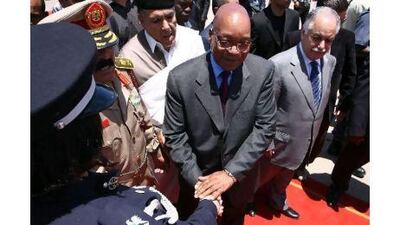BENGHAZI // South African president Jacob Zuma's mediation trip to Libya this week will test the relevance of the increasingly discredited African Union as well as an old friendship between South Africa's governing party and Colonel Muammar Qaddafi.
Mr Zuma, who arrived yesterday, will be seeking to restore some faith in the 54-nation Pan-African body, whose diplomatic efforts to resolve Libya's crisis were sideswiped by Nato air strikes that began on March 19.
Officially, Mr Zuma arrives in Tripoli, the capital and stronghold of Colonel Qaddafi, whose command centres have been pounded by a relentless Nato bombardment for days, to resuscitate an African road map drawn up in February that calls for an immediate ceasefire.
Unofficially, Mr Zuma will try to persuade Colonel Qaddafi to step down, South Africa's influential Mail and Guardian newspaper reported, quoting a senior security source.
His visit comes as all sides appear stalemated: Colonel Qaddafi has remained intransigent in the face of stepped-up Nato air strikes; the rebels have proved unable to capitalise on the air strikes to advance the battle fronts and are fast running out of cash even as they win increasing diplomatic recognition.
Hundreds of thousands of Libyans are suffering in Tripoli from the trauma of the bombings as well as growing shortages and increasing prices of fuel and food. Much hardship has also been reported in western mountain towns besieged by Colonel Qaddafi's forces and in refugee settlements at borders with Tunisia, Chad and Egypt.
South Africa voted for the UN resolution authorising a no-fly zone over Libya and the use of force to protect civilians, using its power as a rotating member of the Security Council to flout an African Union stance demanding a peaceful resolution. Since then, Mr Zuma has joined other African leaders in accusing Nato of overstepping the UN mandate and calling for an end to the air strikes.
Relations with Colonel Qaddafi already were strained when Mr Zuma came to Tripoli in April at the head of an African delegation. He came away pleased, having won the leader's agreement to a ceasefire. But later the same day it became clear that Colonel Qaddafi was not honouring his word.
The rebels' National Transitional Council in their eastern bastion of Benghazi already had dismissed the African road map because it did not demand that Colonel Qaddafi surrender power.
The African plan calls for an immediate ceasefire and for ensuring humanitarian aid reaches all who need it. The plan calls for the protection of foreigners, including African migrants and "adoption and implementation of the political reforms necessary for the elimination of the causes of the current crisis".
In Benghazi on Saturday, rebel council chairman Mustafa Abdul-Jalil emphasised that any solution would have to involve Colonel Qaddafi's departure.
"We would like to reconfirm that the basis of any consideration for the resolution of the Libyan crisis, is the elimination of the main cause of this crisis, Colonel Qaddafi."
The Mail and Guardian said Mr Zuma's visit to Tripoli is at the request of the rebels, though no rebel official would confirm that.
"We welcome any political solutions that help end the bloodshed, but they must be predicated on the departure of Qaddafi, his sons and his regime," Mr Abdul-Jalil said.
Mr Zuma has known Colonel Qaddafi since the 1980s, when he was the intelligence chief of the then-outlawed African National Congress and Colonel Qaddafi provided arms and money for its fight to end a brutal white minority regime in South Africa. Two decades later, Nelson Mandela was able to return the favour, using his international moral standing to end Libya's pariah status. Mr Mandela helped broker the agreement that ended sanctions imposed on Libya over the downing of a civilian aircraft that killed all 270 passengers over Lockerbie, Scotland.
For Mr Zuma, the mission is an opportunity to redeem the African Union, as leaders say they are being upstaged on their own turf by other world diplomatic efforts.
The African Union Commission chief, Jean Ping, said at a summit in Ethiopia last week: "Some international players seem to be denying Africa any significant role in the search for a solution to the Libyan conflict.
"Africa is not going to be reduced to the status of an observer of its own calamities," Mr Ping warned.
Mr Zuma also has a hurtful bilateral issue to discuss with Colonel Qaddafi.
South African officials say Colonel Qaddafi misled them with assurances that a missing South African photojournalist, Anton Hammerl, was alive and in Libyan custody.
Four journalists held in Libya revealed upon their release that Mr Hammerl was shot and killed by government forces on April 5 and left to die in the desert.

